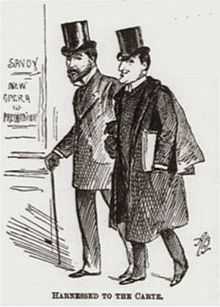Edward Solomon

Edward Solomon (25 July 1855 – 22 January 1895) was a prolific English composer, as well as a conductor, orchestrator and pianist. Though he died before his fortieth birthday, he wrote dozens of works produced for the stage, including several for the D'Oyly Carte Opera Company, such as The Nautch Girl, among others.
Life and career
Edward ("Teddy") Solomon was born in London of Jewish descent.[1]
Early career
His first comic opera was A Will With a Vengeance (1876), a one-act work with a libretto by Frederick Hay, based on La Vendetta. This was produced at the Globe Theatre. In 1879, he met Henry Pottinger "Pot" Stephens while he was the musical director at the Royalty Theatre conducting, among other works, Arthur Sullivan's The Zoo. With Stephens, he produced his first successes, Billee Taylor (1880), a "nautical comedy opera" in two acts; and Claude Duval (1881, celebrating a well known 18th century highwayman),[2] both of which remained popular for many years in both the UK and US. Other Solomon and Stephens successes were Lord Bateman, or Picotee's Pledge (1882), Virginia, or Ringing the Changes (1883)[3] and later The Red Hussar (1889), a "comedy opera" in three acts.[4] Together, they would also write Popsy Wopsy, a "musical absurdity" (1880) and Pocahontas (1884).
Solomon also wrote the music for the short companion pieces Quite an Adventure (1881; Olympic Theatre; revived in 1894 at the Savoy Theatre) and Round and Square (1885), each with a libretto by Frank Desprez, and each produced on tour by D'Oyly Carte companies in the 1880s and 1890s. Other early shows included Love and Larceny in 1881, a farce, Through the Looking-Glass (1882), The Vicar of Bray, a comic opera with a libretto by Sydney Grundy (1882; revived 1892 at the Savoy),[5] the successful Polly, or The Pet of the Regiment (1884) and Pepita; or, the Girl with the Glass Eyes (1886).[6][7] He also wrote ballads like "I Should Like To" and "Over the Way", and numerous salon piano solos and arrangements. For instance, he arranged George Grossmith's "See Me Dance the Polka" for piano.
Later career

With F. C. Burnand, Solomon wrote Pickwick (1889), which also had a run in 1894,[8] Domestic Economy (1890), and "The Tiger" (1890). Burnand's contribution to the last of these was so unacceptable that the work was hissed off the stage on its opening night.[9]
From 1891–93, after Gilbert and Sullivan had temporarily separated, Richard D'Oyly Carte mounted a number of non-G&S pieces to keep the Savoy Theatre open, including a revival of The Vicar of Bray in 1892. Solomon's most famous work produced by the D'Oyly Carte Opera Company was probably The Nautch Girl or, The Rajah of Chutneypore (1891), an "Indian comic opera" in two acts with a libretto by George Dance, and lyrics by George Dance and Frank Desprez. It initially ran for 200 performances at the Savoy Theatre and then toured. The company also toured The Vicar of Bray.[4]
His last stage work was On the March (1896), a musical comedy in two acts, with John Crook and Frederic Clay, to a libretto by William Yardley, B. C. Stephenson and Cecil Clay, based on In Camp by Victoria Vokes.
Bigamous marriage and other information
Solomon became notorious because of his bigamous marriage to American prima donna Lillian Russell, whom he met at Tony Pastor's New York Casino Theatre where he was the musical director and she became the star. Subsequently, she starred in several of his works, including Billee Taylor, Polly and Pocahontas. When she learned of his previous marriage, she sued for divorce.
His brother Frederick Solomon sang in Billee Taylor in the provinces (1883) and was the composer of the comic opera Captain Kidd, or The Bold Buccaneer, produced at the Prince of Wales's Theatre, Liverpool, on 10 September 1883.
Had he lived, Solomon might have been chosen to complete Sullivan and Hood's The Emerald Isle after Sullivan's death in 1900, because of Solomon's relationships with Sullivan and Carte. But Solomon died in London of typhoid fever in 1895 at the age of 39.
Selected operas by Solomon
- Billee Taylor (1880)
- Quite an Adventure (1881)
- The Vicar of Bray (1882)
- The Red Hussar (1889)
- The Nautch Girl (1891)
Notes
- ↑ Profile of Solomon at the Opera World site
- ↑ Review of Claude Duval
- ↑ Libretto to Virginia
- ↑ 4.0 4.1 Solomon's profile at the Who Was Who in the D'Oyly Carte website
- ↑ Reynolds's Newspaper, 23 July 1882, p. 8
- ↑ Welch, Deshler. - The Theatre, vol. 1, 1886, p. 150, accessed June 27, 2013
- ↑ Brown, Thomas Alston. A History of the New York Stage, 1903, p. 176, accessed June 27, 2013
- ↑ Moss, Simon. Programme and description of 1894 production, Gilbert & Sullivan, a selling exhibition of memorabilia, Archive: Other items
- ↑ Tillett, Selwyn. "The Nautch Girl", article in centenary book for Haddon Hall. Sir Arthur Sullivan Society, 1992, p. 7.
References
- Hyman, Alan (1978). Sullivan and His Satellites. London: Chappell.
External links
- Edward Solomon at the IBDB database
- List of many of Solomon's stage works
- Profile of Solomon at the Who Was Who in the D'Oyly Carte Opera Company website
- Listing of English musicals with links
- Information about Savoy curtain raisers
- Free scores by Edward Solomon at the International Music Score Library Project
|